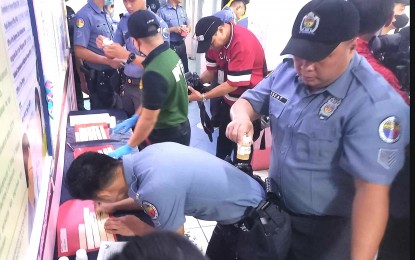
DRUG-FREE WORKPLACE. Personnel of the Baguio City Jail male dormitory on Tuesday (Aug. 2, 2023) submit themselves to drug testing before the personnel of the Philippine Drug Enforcement Agency-Cordillera Administrative Region (PDEA-CAR) to renew its drug-cleared and drug-free certification. PDEA-CAR director Julius Paderes called on both the pubic and private sector to implement a comprehensive drug-free workplace program. (PNA photo courtesy of Romeo Gonzales)
BAGUIO CITY – The Baguio City Jail Male Dorm (BCJMD) on Wednesday said it remains enthusiastic with its goal to have its jail facility declared as drug-free.
Superintendent April Rose Ayangwa, warden of the Baguio City Jail Male Dorm (BCJMD), told the Philippine News Agency that the jail facility had earlier been declared drug-cleared and drug-free. But due to the pandemic, the renewal of the certification was suspended.
“We are working on the certification for a drug-cleared jail facility. Then we will pursue the application for a drug-free facility,” she said.
A place is declared drug-cleared after a year of consistently having a negative drug test result of all workers in four quarters of unannounced testing, anti-drug lectures, and no paraphernalia during spot inspections.
A drug-cleared certification is required before a facility can be declared drug free. The facility management must apply for its issuance within six months after the place is declared drug-cleared.
On Tuesday, the Philippine Drug Enforcement Agency in the Cordillera Administrative Region (PDEA-CAR), the police and the BJMP, aided by sniffing canines, jointly conducted a greyhound operation (strip search) of the entire facility aside from the mandatory drug testing of personnel.
“We want the BCJMD to be certified again because it means we support the government’s call in its fight against illegal drugs, we are serious about our mandate on development and Rehabilitation and we are assured that the PDLs and the families that visit are safe, and most importantly, that no personnel of the unit is involved with illegal drugs,” Ayangwa said.
The BCJMD’s population as of Aug. 2 is 352 PDLs with 53 percent of the detainees charged with violation of Republic Act 9165 or the Anti-Illegal Drugs Law.
She said they also conduct greyhound operations on their own, aside from quarterly subjecting all personnel and at least 20 percent of all PDLs randomly selected to drug testing. They also conduct drug symposiums and lectures.
Julius Paderes, regional director of the PDEA-CAR, in an interview on Wednesday stressed the government’s anti-drug policy to pursue an integrated approach in the planning and implementation of anti-drug strategies as it recognized the continuing proliferation of illegal drugs and related incidents in controlled facilities.
“The drug clearing program in controlled facilities like the jail was made due to the serious threat to the health, and reformation of persons deprived of liberty (PDLs), assuring a non-return to the trade if they are given the chance to return to the community,” he said.
“The program recognizes a comprehensive and balanced approach to the drug demand and drug education strategy of the government, and the BJMP (Bureau of Jail Management and Penology) and BuCor (Bureau of Corrections) are seen as active partners of the law enforcement agencies in implementing the anti-illegal drugs law,” he added.
Paderes called on both the public and private sectors to heed the call of the Dangerous Drugs Board and the Department of Labor and Employment to implement a comprehensive drug-free workplace program.
“The drug issue in the country is certainly a complex issue both as a health and social concern. To address this, strategies on all fronts have been developed by the government; however, the strategy's success can only be realized if the community participates actively,” Paderes said. (PNA)
